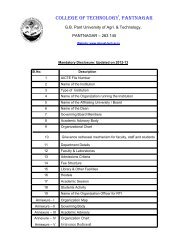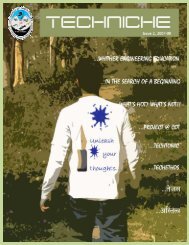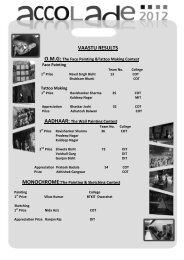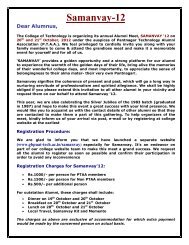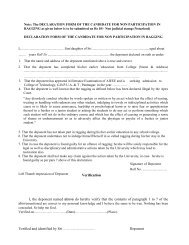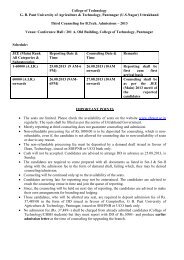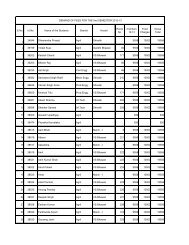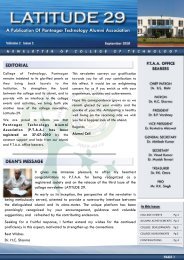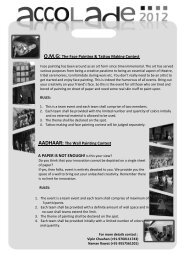Techniche 5th issue (Read-Only) - College of Technology, Pantnagar
Techniche 5th issue (Read-Only) - College of Technology, Pantnagar
Techniche 5th issue (Read-Only) - College of Technology, Pantnagar
You also want an ePaper? Increase the reach of your titles
YUMPU automatically turns print PDFs into web optimized ePapers that Google loves.
Teccomplish<br />
And that night, the banquet the townspeople held in<br />
her honour, was the first time in Clarksville's history<br />
that blacks and whites had ever gathered together for<br />
the same event. She went on to participate in protests in<br />
the city until the segregation laws were struck down.<br />
Wilma’s success story is incomplete without<br />
considering her struggle. Wilma once said “The triumph<br />
can't be had without the struggle. And<br />
I know what struggle is. Never underestimate<br />
the power <strong>of</strong> dreams and the influence<br />
<strong>of</strong> the human spirit. We are all the same in<br />
this notion. The potential for greatness lives<br />
within each <strong>of</strong> us. Believe me, the reward is<br />
not so great without the struggle”.<br />
Retiring from track competition in 1962, she returned<br />
to receive a Bachelor's degree in Education,<br />
graduating in 1963. The same<br />
year, she married her high school<br />
sweetheart, Robert Eldridge, with<br />
whom she had four children.<br />
Wilma had achieved what seemed to<br />
be impossible for a black, handicapped<br />
American woman but still she had<br />
many challenging doubts about her self<br />
being “What do you do after you<br />
are world famous and nineteen<br />
or twenty and you have sat<br />
with prime ministers, kings<br />
and queens, the Pope? Do you<br />
go back home and take a job? What do you<br />
do to keep your sanity? You come back to<br />
the real world. ”In 1967 on the invitation <strong>of</strong> Vice-<br />
President Hubert Humphrey, Wilma participated in<br />
"Operation Champ," an athletic outreach program for<br />
underprivileged youth in the ghettoes <strong>of</strong> 16 major cities.<br />
Her own non-pr<strong>of</strong>it organization, ‘The Wilma Rudolph<br />
Foundation’, continued this work and provided<br />
free coaching in a variety <strong>of</strong> sports, and academic assistance<br />
and support as well.<br />
Wilma’s enduring fame won her accolades<br />
in both her life and after it. On December 2, 1980,<br />
Tennessee State University named its indoor track after<br />
her. She was one <strong>of</strong> the 75 women chosen for the book<br />
I Dream a World: Portraits <strong>of</strong> Black Women Who<br />
The triumph can't be had<br />
without the struggle. And I<br />
know what struggle is.<br />
Never underestimate the<br />
power <strong>of</strong> dreams and the influence<br />
<strong>of</strong> the human spirit.<br />
We are all the same in this<br />
notion. The potential for<br />
greatness lives within each<br />
<strong>of</strong> us. Believe me, the reward<br />
is not so great without the<br />
struggle.<br />
Page 13<br />
Changed America (1989) by Pulitzer Prize winning<br />
photographer Brian Lanker. Within this book Rudolph<br />
joined such company as Rosa Parks, Coretta Scott<br />
King, Oprah Winfrey, Lena Horne, and Sarah<br />
Vaughan.<br />
On November 12, 1994, when at the age <strong>of</strong> 54, Wilma<br />
died <strong>of</strong> cancer, Leroy Walker, President <strong>of</strong> the U.S.<br />
Olympic Committee, said, "All <strong>of</strong> us recognize that this<br />
is obviously a tremendous loss. Wilma was very much<br />
involved with a number <strong>of</strong> Olympic programs. It's a<br />
tragic loss. She was struck with an illness that, unfortunately,<br />
we can't do very much about." Across Tennessee,<br />
the state flag flew at half-staff. The same year, a<br />
portion <strong>of</strong> U.S. Route 79 in Clarksville was named the<br />
Wilma Rudolph Boulevard in her memory<br />
The Women's Sports Foundation Wilma<br />
Rudolph Courage Award is presented to a female ath-<br />
lete who exhibits extraordinary courage in<br />
her athletic performance, demonstrates the<br />
ability to overcome adversity, makes significant<br />
contributions to sports and serves as an<br />
inspiration and role model to those who face<br />
challenges, overcomes them and strives for<br />
success at all levels. Jackie Joyner-Kersee<br />
was the first athlete to be awarded this prize<br />
in 1996.<br />
In 1997, Governor Don Sundquist proclaimed<br />
June 23 as Wilma Rudolph Day in<br />
Tennessee. In 2004, the United States Postal<br />
Service <strong>issue</strong>d a 23 cent stamp in recognition<br />
<strong>of</strong> her accomplishment. Wilma described her<br />
motivation as-“I loved the feeling <strong>of</strong><br />
freedom in running, the fresh air, the feeling<br />
that the only person I'm competing with is<br />
me”.<br />
Her life is a story <strong>of</strong> achieving against all the odds. Her<br />
extra-ordinary achievements are still alive in public<br />
consciousness and continue to inspire many young people<br />
who look up to her. Winning is great, sure,<br />
but if you are really going to do something<br />
in life, the secret is learning how to lose. Nobody<br />
goes undefeated all the time. If you<br />
can pick up after a crushing defeat, and go<br />
on to win again, you are going to be a champion<br />
someday.





